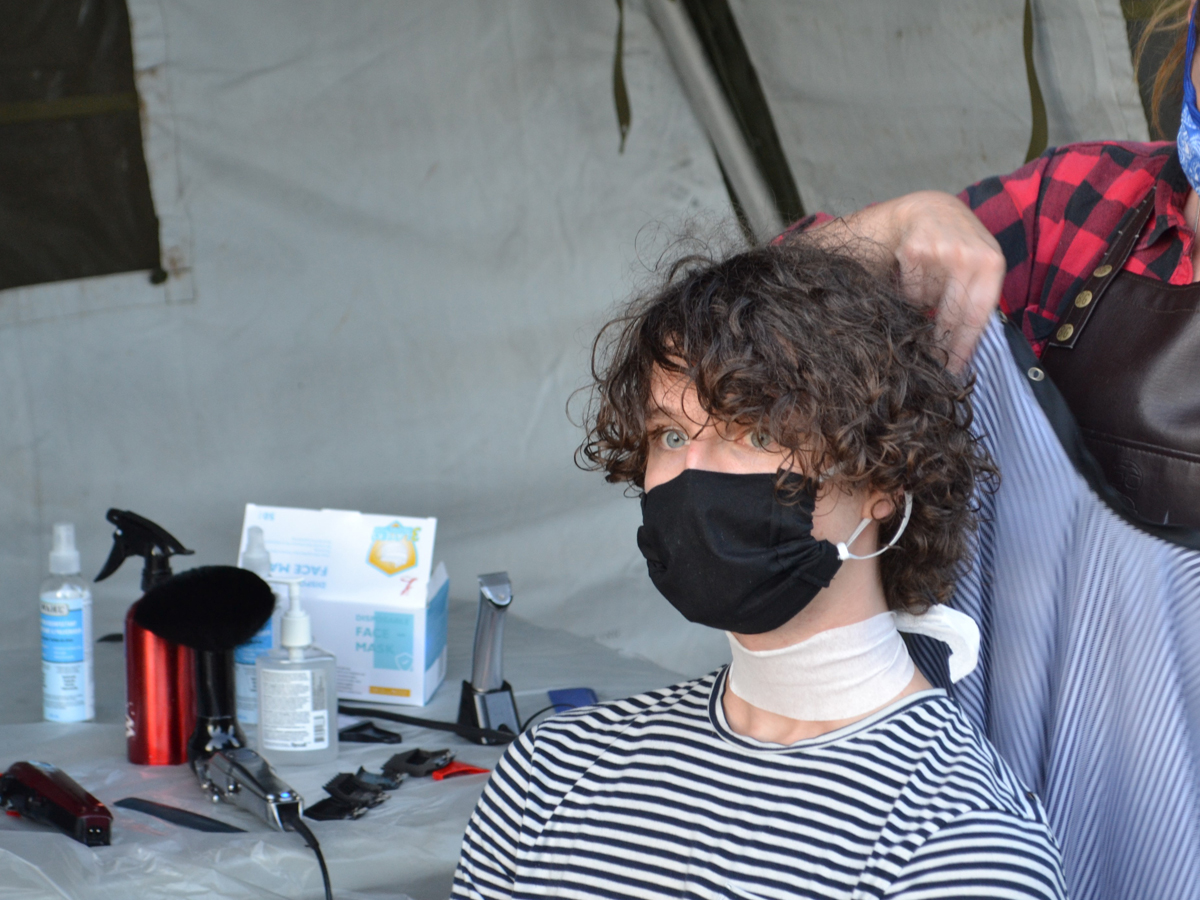Basic training underway with COVID-19 protocols in place
By Lookout on Aug 25, 2020 with Comments 0

In a makeshift tented barber shop in Work Point, 40 recruits enrolled in Basic Military Qualification training shed their civilian locks for the more formal military look.
Peter Mallett, Staff Writer ~
Forty new military recruits enrolled in Basic Military Qualification (BMQ) training at CFB Esquimalt have been placed inside a self-isolating bubble to mitigate COVID-19.
Recruits are confined to Work Point to live and train for 10 weeks, and will not be permitted outside the facility at any time.
“This situation is absolutely new to us and there are a new set of rules involved,” said Lt(N) Guillaume Brochu, Leadership Division Section Officer with Naval Fleet School (Pacific) (NFS(P)). “BMQ is already an important and complicated course to administer and involves taking civilians, many of which have no formal military training, and transforming them into regular force members. Now, this effort has been made more complicated with restrictive COVID-19 measures.”
These recruits are among the first wave of Regular Force military trainees across Canada taking part in the BMQ restart since COVID swept across the world in March. To assist with the Canadian Armed Forces (CAF)-wide recruit training backlog, and to prove the concept of decentralized BMQ training delivery by the various service elements, the Naval Fleet Schools (under the leadership of the Naval Personnel and Training Group) on each coast were tasked with running a BMQ serial.
In hitting the BMQ restart button, enhanced force protection measures have been implemented at Work Point. All recruits and staff must wear non-medical face coverings and gloves when social distancing is not feasible.
To further fight the spread of any potential viral infection, the entire course is broken down into four 10-person sections called “cohorts”, in much the same way that compartmentalization in a ship limits the spread of flooding. Initially, the four cohorts will remain separated, only coming together in larger groups after the initial two-week period has passed with no outbreaks occurring. Additionally, eight members of the instructional staff are also isolating at Work Point for that initial period.
Also, each day recruits must fill out a daily health questionnaire and if they show any symptoms of COVID-19 they must display a red card on their cabin door. They will then be examined by staff of Canadian Forces Health Services (Pacific) before the appropriate follow-on protocols are actioned. At every step of the planning, Health Services have been engaged, and have been extremely helpful with the provision of expertise and guidance, said Lt(N) Brochu.
He added that BMQ instructional staff, a core portion of whom underwent General Military Training Instruction (GMTI) coursing at the Canadian Forces Leadership and Recruit School (CFLRS) in St. Jean, Quebec, in July, are very keen to tackle this job, and are approaching the demands of the course and the unique conditions surrounding it in a highly professional and responsive manner.
A Morale and Wellness Officer has been appointed to design and execute a program of leisure, social, and fitness activities to relieve stress while mitigating, to some extent, the absence of shore leave recruits were able to earn part way through training on pre-COVID basic training serials. Specialized spaces have been set up in the barracks block, such as a CANEX Annex mini-mart and a multi-faith quiet room, for use by the recruits.
A typical day during BMQ has recruits up at 5 a.m. for physical training followed by breakfast, and then drill and instruction emphasizing basic military skills, such as weapons handling, map and compass use, marches of up to eight kilometres in full combat gear, first aid, and CAF values training.
Since physical fitness is a key component of naval and military service, a large part of the course is spent on fitness training. They will tackle a range of challenging physical requirements, such as the confidence course and rappelling, and will also undergo the CAF’s FORCE Evaluation fitness testing.
Before lights out at 10 p.m., the remainder of the recruits’ time is spent studying, preparing for the next day’s lessons, polishing their boots, and making sure their uniforms are clean, pressed, and presentable for the next day.
Preparing for this BMQ event has been an “all hands on deck” process, and stakeholders from across the Formation have contributed significantly to the overall effort, said Lt(N) Brochu. These include Personnel Support Programs, Base Administration, Base Logistics, Base Operations Range Control, Base Foods, Base Information Services, Base Accommodations, TEME, Real Property Operations, Health Services, CANEX, and Personnel Coordination Centre.
The training is now underway, and the 40 recruits, all of whom are in the Royal Canadian Navy, are taking their first steps towards a career in the CAF.
––––
Filed Under: Top Stories
About the Author:





